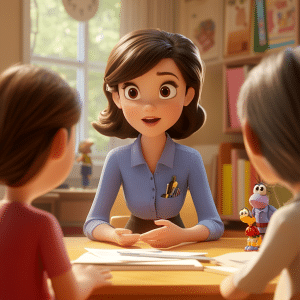When children face emotional challenges, behavioral difficulties, or traumatic experiences, specialized child therapy services can provide the healing support they need. At The Center for Child Development, we understand that childhood trauma treatment and emotional support require approaches specifically designed for young minds.
Why Children Need Specialized Therapy Approaches
Child therapy differs significantly from adult counseling because children often express themselves through play, behavior, and nonverbal communication rather than words alone. Whether your child is struggling with anxiety, trauma, behavioral issues, or developmental challenges, evidence-based child therapy techniques can help them heal and thrive.
Family involvement is crucial for successful outcomes in pediatric therapy. That’s why our comprehensive approach includes both direct child treatment and parent education programs.
1. Play Therapy: The Foundation of Child Healing
Play therapy is a proven therapeutic method that uses children’s natural language—play to help them process emotions and develop healthy coping skills. This child-centered therapy approach fosters a safe environment where children can express difficult feelings through various media, including toys, games, creative arts, and storytelling.
What Play Therapy Treats:
- Childhood anxiety and depression
- Aggressive or defiant behaviors
- Family transitions (divorce, new siblings, grief and loss)
- Social skills development
- Emotional regulation difficulties
- School-related stress and academic challenges
Certified play therapists employ specialized techniques to help children navigate complex emotions in developmentally appropriate ways, making this approach highly effective for child mental health support.
2. TraumaPlay™: Specialized Childhood Trauma Treatment
TraumaPlay™ represents a breakthrough in trauma-informed therapy for children. Developed by Paris Goodyear-Brown, this integrative model combines play therapy with structured trauma processing techniques specifically designed for young survivors.
Ideal for Children Who Have Experienced:
- Physical, emotional, or sexual abuse
- Medical trauma and hospitalization
- Loss, abandonment, or neglect
- Foster care transitions and adoption challenges
- Witnessing violence or accidents
- Natural disasters or community trauma
Key TraumaPlay™ Components:
- Safety and emotional regulation building
- Gradual, child-paced trauma processing
- Attachment repair and family connection
- Resilience building and empowerment
- Caregiver involvement throughout treatment
This evidence-based trauma therapy helps children process difficult experiences without re-traumatization, making it one of the most effective approaches for childhood PTSD treatment.
3. EMDR for Children: Advanced Trauma Processing
EMDR therapy for children (Eye Movement Desensitization and Reprocessing) offers a powerful way to help young minds heal from traumatic memories. This neurobiologically informed treatment utilizes bilateral stimulation to help the brain reprocess disturbing memories in a less distressing manner.
Pediatric EMDR is specially adapted for children using:
- Age-appropriate metaphors and imagery
- Play-based bilateral stimulation
- Storytelling and creative expression
- Child-friendly trauma processing techniques
EMDR Effectively Treats:
- Post-traumatic stress disorder (PTSD) in children
- Specific phobias and fears
- Anxiety disorders and panic symptoms
- Low self-esteem and negative self-beliefs
- Medical trauma from procedures or accidents
- Attachment trauma and relational difficulties
4. Parent Support Groups: Strengthening the Healing Foundation
Parent education and support are essential components of successful child therapy outcomes. Our parent support groups provide caregivers with the tools and knowledge needed to support their child’s healing journey.
Parent Group Benefits:
- Learn about child development and trauma responses
- Practice emotional regulation techniques for home use
- Develop attachment-building strategies
- Connect with other families facing similar challenges
- Receive ongoing support from licensed child therapists
- Strengthen family relationships and communication
These evidence-based parenting programs help create a supportive home environment that reinforces therapeutic progress and promotes long-term healing.
Signs Your Child May Benefit from Professional Support
Behavioral Indicators:
- Regression in development (bedwetting, baby talk)
- Aggressive or destructive behavior
- Withdrawal from family, friends, or activities
- Sleep disturbances or nightmares
- School avoidance or academic decline
- Excessive worry or fearfulness
Emotional Signs:
- Persistent sadness or mood changes
- Difficulty regulating emotions
- Low self-esteem or negative self-talk
- Trauma symptoms (flashbacks, avoidance)
- Attachment difficulties with caregivers
Frequently Asked Questions About Child Therapy
Q: How long does child therapy typically take? A: Treatment duration varies based on individual needs, but most children show progress within 12 to 20 sessions. Trauma therapy may require longer-term support.
Q: Will my child talk about what happened? A: Child therapists use play and creative approaches, so children don’t need to discuss trauma verbally. Healing happens through expressive and play-based techniques.
Q: How involved will I be as a parent? A: Family involvement is crucial. We include parents through regular consultation, parent support groups, and home-based strategies.
Take the Next Step: Professional Child Therapy Services
If your child is struggling with emotional challenges, behavioral difficulties, or trauma, professional support can make a significant difference. Our comprehensive child therapy services combine play therapy, TraumaPlay™, and EMDR with parent support to create lasting healing.
Contact The Center for Child Development today to schedule a consultation and learn how our specialized child therapy programs can support your family’s healing journey.
Ready to Begin Healing?
- Please schedule a consultation with our child therapy specialists
- Join our next parent support group
- Learn more about trauma-informed care for children
- Explore our comprehensive family therapy services
At The Center for Child Development, every child deserves compassionate, evidence-based care that honors their unique healing journey.


